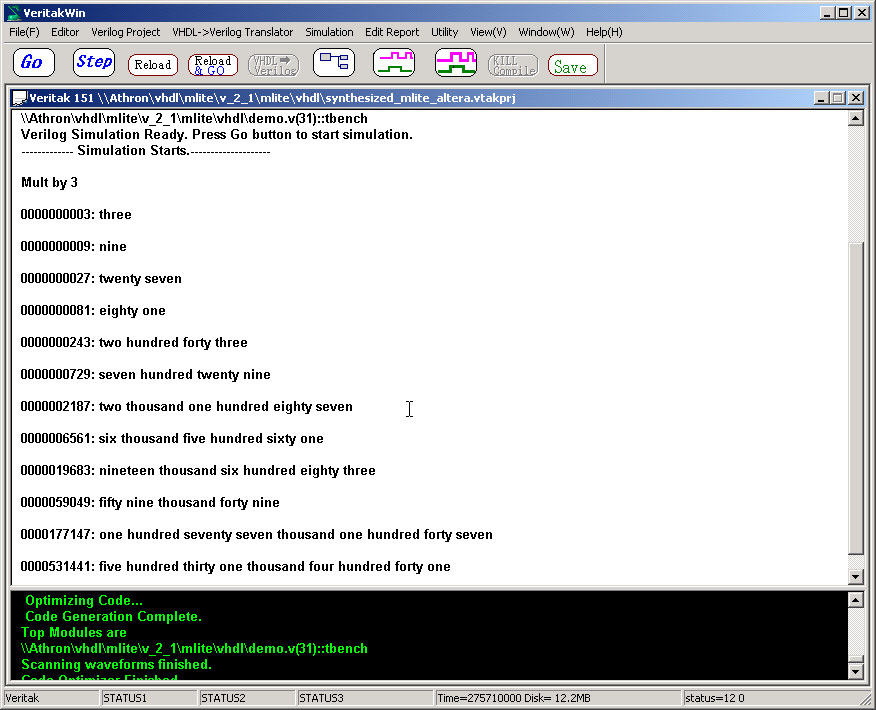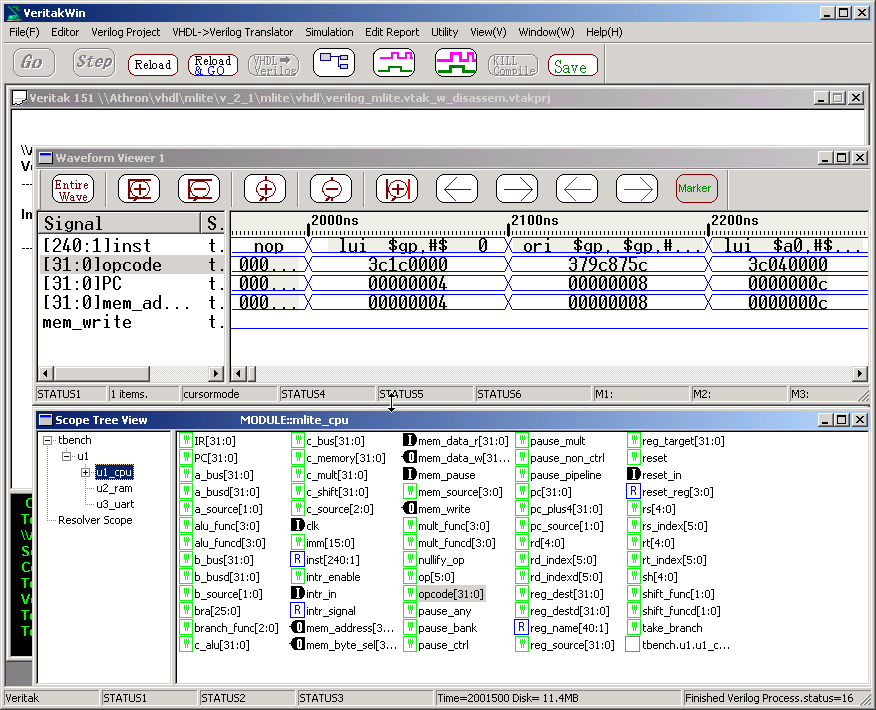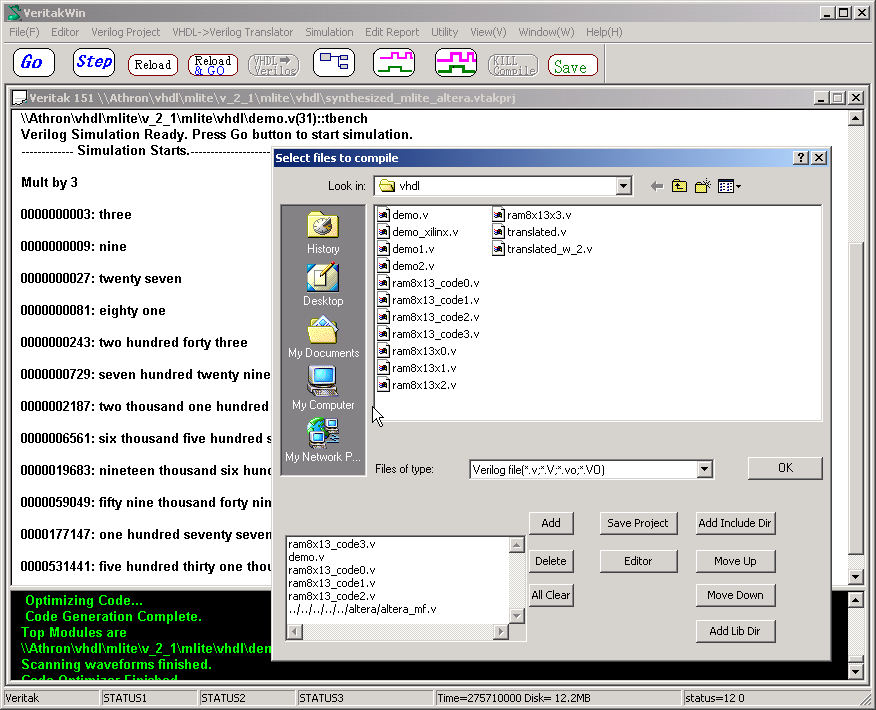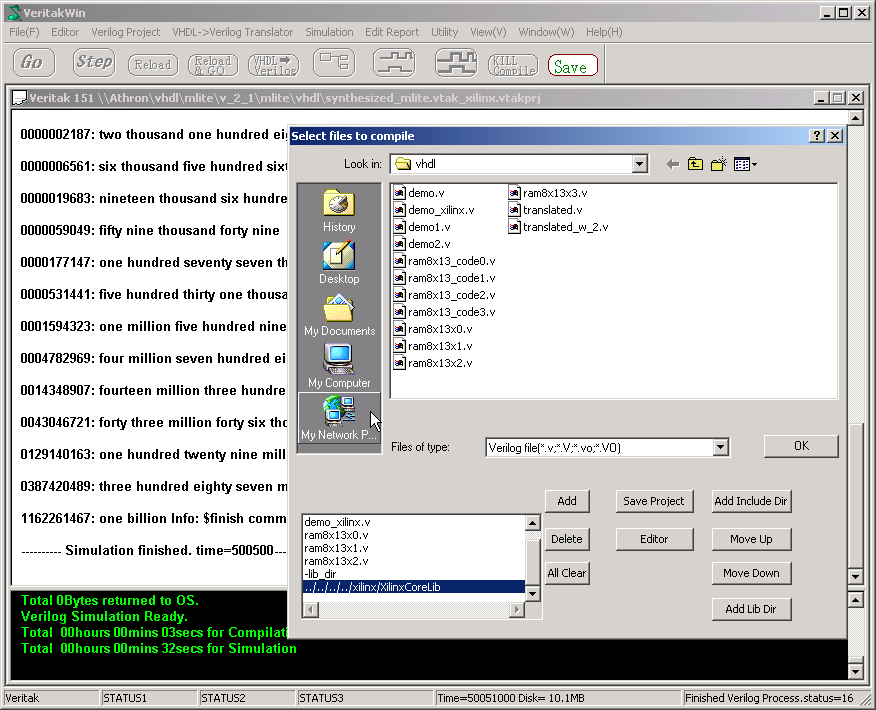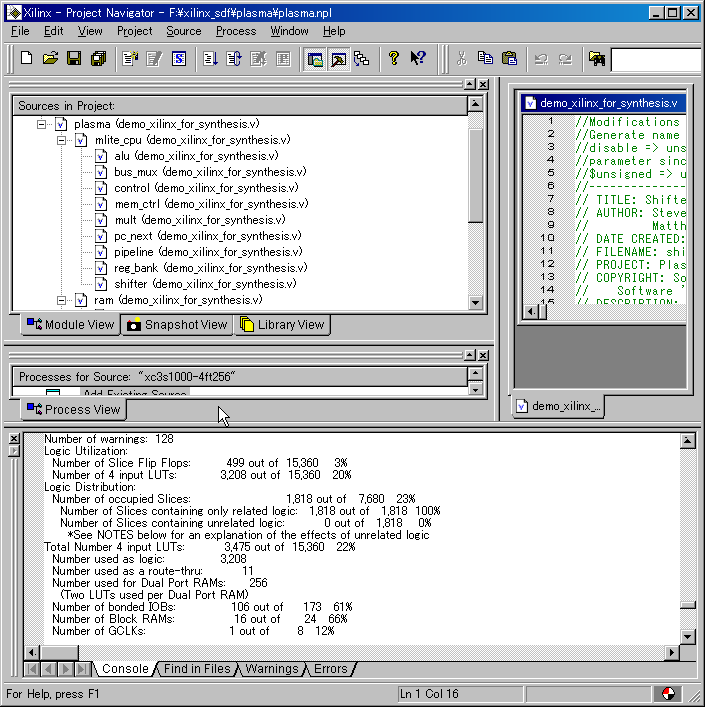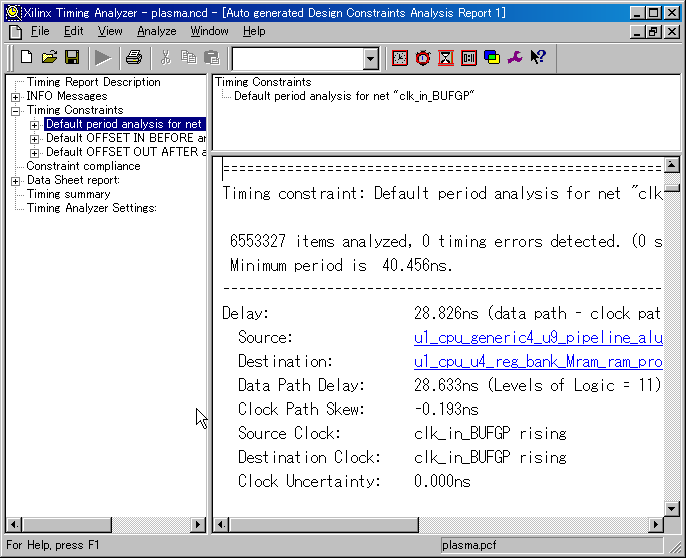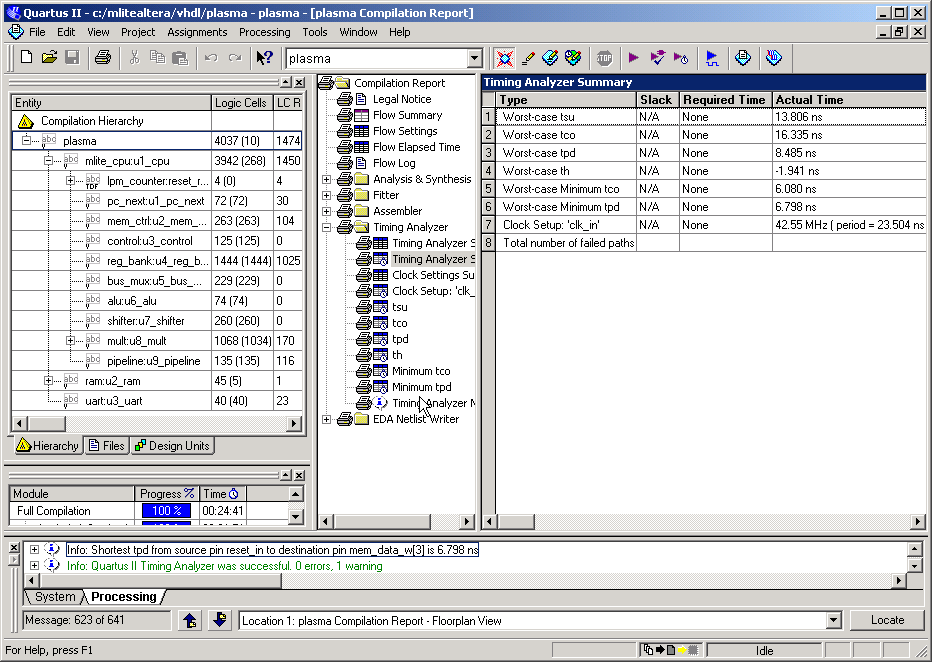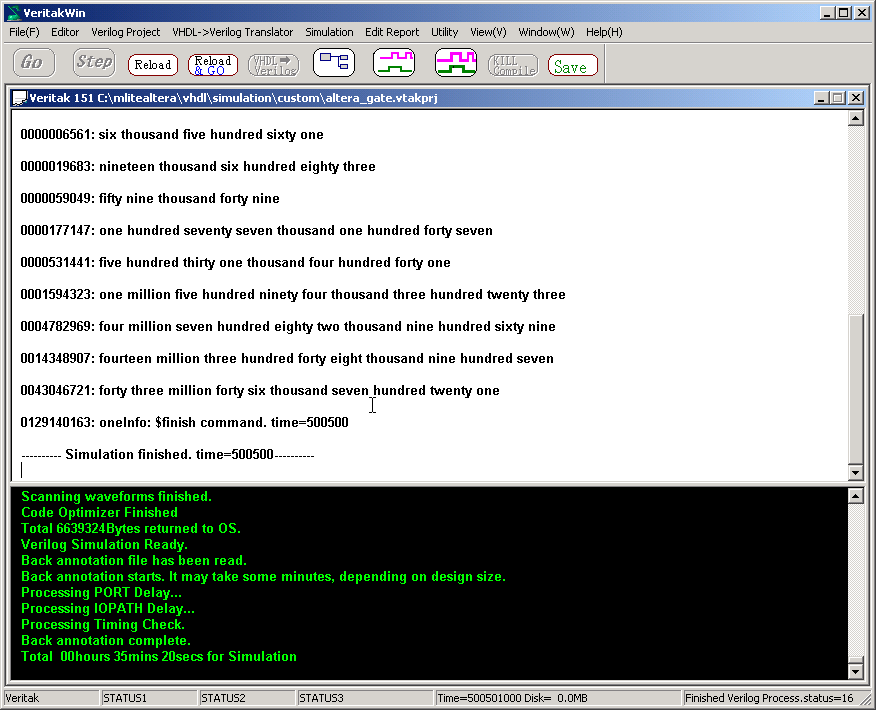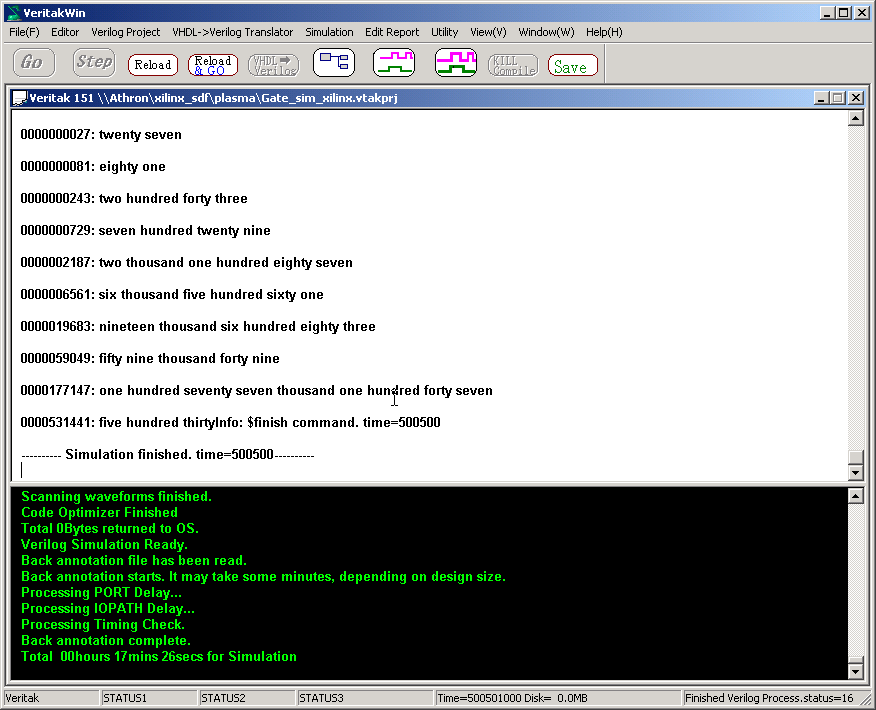`ifdef Veritak
//Disassemblar
reg [30*8:1] inst;
wire [31:0] IR=opcode;//TAK Mar.15.2005
wire [31:0] PC=pc;//Tak Mar.15.2005
wire [5:0] op=IR[31:26];
wire [25:0] bra=PC+{{10{IR[15]}},IR[15:0]}*4;//+4;
wire [4:0] rs=IR[25:21];
wire [4:0] rt=IR[20:16];
wire [4:0] rd=IR[15:11];
wire [4:0] sh=IR[10:6];
reg [5*8:1] reg_name="abcd";
function [4*8:1] get_reg_name;
input [4:0] field;
begin
case (field)
0: get_reg_name="$z0";
1: get_reg_name="$at";
2: get_reg_name="$v0";
3: get_reg_name="$v1";
4: get_reg_name="$a0";
5: get_reg_name="$a1";
6: get_reg_name="$a2";
7: get_reg_name="$a3";
8,9,10,11,12,13,14,15:
$sprintf(get_reg_name,"$t%1d",field-8);
16,17,18,19,20,21,22,23,24,25: $sprintf(get_reg_name,"$s%1d",field-16);
26:get_reg_name="$k0";
27:get_reg_name="$k1";
28:get_reg_name="$gp";
29:get_reg_name="$sp";
30:get_reg_name="$s8";
31:get_reg_name="$ra";
endcase
end
endfunction
always @*begin:sprintf //Jan.20.2005 @ (IR,op,bra,rs,rt,rd,sh) begin :sprintf
reg [4*8:1] rdn;//
reg [4*8:1] rsn;
reg [4*8:1] rtn;
rdn=get_reg_name(rd);
rsn=get_reg_name(rs);
rtn=get_reg_name(rt);
case (op)
0:
case (IR[5:0])
0: if (rd==0 && rt==0 && rs==0 ) $sprintf(inst,"nop");
else $sprintf(inst,"tsll %s,%s,%2d\n",rdn,rtn,sh);
2:
$sprintf(inst," srl %s,%s,%2d\n",rdn,rtn,sh);
3:
$sprintf(inst," sra %s,%s,%2d\n",rdn,rtn,sh);
4:
$sprintf(inst," sllv %s,%s,%s\n",rdn,rtn,rsn);
6:
$sprintf(inst," srlv %s,%s,%s\n",rdn,rtn,rsn);
7:
$sprintf(inst," srav %s,%s,%s\n",rdn,rtn,rsn);
8:
$sprintf(inst," jr %s\n",rsn);
9:
$sprintf(inst," jalr %s\n",rsn);
12:
$sprintf(inst," syscall\n");
13:
$sprintf(inst," break");
16:
$sprintf(inst," mfhi %s\n",rdn);
17:
$sprintf(inst," mthi %s\n",rsn);
18:
$sprintf(inst," mflo %s\n",rdn);
19:
$sprintf(inst," mtlo %s\n",rsn);
24:
$sprintf(inst," mult %s,%s\n",rsn,rtn);
25:
$sprintf(inst," multu %s,%s\n",rsn,rtn);
26:
$sprintf(inst," div %s,%s\n",rsn,rtn);
27:
$sprintf(inst," divu %s,%s\n",rsn,rtn);
32:
$sprintf(inst," add %s,%s,%s",rdn,rsn,rtn);
33:
if(rt==0)
$sprintf(inst," move %s,%s\n",rdn,rsn);
else
$sprintf(inst," addu %s,%s,%s\n",rdn,rsn,rtn);
34:
$sprintf(inst," sub %s,%s,%s\n",rdn,rsn,rtn);
35:
$sprintf(inst," subu %s,%s,%s\n",rdn,rsn,rtn);
36:
$sprintf(inst," and %s,%s,%s\n",rdn,rsn,rtn);
37:
if(rt==0)
$sprintf(inst," move %s,%s\n",rdn,rsn);
else
$sprintf(inst," or %s,%s,%s\n",rdn,rsn,rtn);
38:
$sprintf(inst," xor %s,%s,%s\n",rdn,rsn,rtn);
39:
$sprintf(inst," nor %s,%s,%s\n",rdn,rsn,rtn);
42:
$sprintf(inst," slt %s,%s,%s\n",rdn,rsn,rtn);
43:
$sprintf(inst," sltu %s,%s,%s\n",rdn,rsn,rtn);
default:
$sprintf(inst,"Unknown Func. %08h\n",IR);
endcase
1:
case (IR[20:16])
0:
$sprintf(inst," bltz %s,$%08h\n",rsn,bra);
1:
$sprintf(inst," bgez %s,$%08h\n",rsn,bra);
16:
$sprintf(inst," bltzal %s,$%08h\n",rsn,bra);
17:
$sprintf(inst," bgezal %s,$%08h\n",rsn,bra);
default:
$sprintf(inst,"Unknown1 %08h\n",IR);
endcase
2:
$sprintf(inst," j $%08h\n",((IR*4)&32'h0ffffffc)+(PC&32'hf0000000));
3:
$sprintf(inst," jal $%08h\n",((IR*4)&32'h0ffffffc)+(PC&32'hf0000000));
4:
if(rs==0 && rt==0)
$sprintf(inst," bra $%08h\n",bra);
else
$sprintf(inst," beq %s,%s,$%08h\n",rsn,rtn,bra);
5:
$sprintf(inst," bne %s,%s,$%08h\n",rsn,rtn,bra);
6:
$sprintf(inst," blez %s,$%08h\n",rsn,bra);
7:
$sprintf(inst," bgtz %s,$%08h\n",rsn,bra);
8:
$sprintf(inst," addi %s,%s,#$%04h\n",rtn,rsn,IR[15:0]);
9:
if(rs==0)
$sprintf(inst," li %s,#$%08h\n",rtn,IR[15:0]);
else
$sprintf(inst," addiu %s,%s,#$%04h\n",rtn,rsn,IR[15:0]);
10:
$sprintf(inst," slti %s,%s,#$%04h\n",rtn,rsn,IR[15:0]);
11:
$sprintf(inst," sltiu %s,%s,#$%04h\n",rtn,rsn,IR[15:0]);
12:
$sprintf(inst," andi %s,%s,#$%04h\n",rtn,rsn,IR[15:0]);
13:
if(rs==0)
$sprintf(inst," li %s,#$%08h\n",rtn,IR[15:0]);
else
$sprintf(inst," ori %s,%s,#$%04h\n",rtn,rsn,IR[15:0]);
14:
$sprintf(inst," xori %s,%s,#$%04h\n",rtn,rsn,IR[15:0]);
15://load upper immediate
$sprintf(inst," lui %s,#$%04h",rtn,IR[15:0]);
16, 17, 18, 19: begin
if(rs>=16)
$sprintf(inst," cop%d $%08h\n",op&3,IR[25:0]);
else
case(rsn)
0:
$sprintf(inst," mfc%d %s,%s\n",op&3,rtn,rdn);
2:
$sprintf(inst," cfc%d %s,%s\n",op&3,rtn,rdn);
4:
$sprintf(inst," mtc%d %s,%s\n",op&3,rtn,rdn);
6:
$sprintf(inst," ctc%d %s,%s\n",op&3,rtn,rdn);
8, 12:
if(rt&1)
$sprintf(inst," bc%dt %d,%08h\n",op&3,rs*32+rt,bra);
else
$sprintf(inst," bc%df %d,%08h\n",op&3,rs*32+rt,bra);
default:
$sprintf(inst,"Unknown16 %08h\n",IR);
endcase
end
32:
$sprintf(inst," lb %s,$%04h(%s)\n",rtn,IR[15:0],rsn);
33:
$sprintf(inst," lh %s,$%04h(%s)\n",rtn,IR[15:0],rsn);
34:
$sprintf(inst," lwl %s,$%04h(%s)\n",IR[15:0],rsn);
35:
$sprintf(inst," lw %s,$%04h(%s)\n",rtn,IR[15:0],rsn);
36:
$sprintf(inst," lbu %s,$%04h(%s)\n",rtn,IR[15:0],rsn);
37:
$sprintf(inst," lhu %s,$%04h(%s)\n",rtn,IR[15:0],rsn);
38:
$sprintf(inst," lwr %s,$%04h(%s)\n",rtn,IR[15:0],rsn);
40:
$sprintf(inst," sb %s,$%04h(%s)\n",rtn,IR[15:0],rsn);
41:
$sprintf(inst," sh %s,$%04h(%s)\n",rtn,IR[15:0],rsn);
42:
$sprintf(inst," swl %s,$%04h(%s)\n",rtn,IR[15:0],rsn);
43:
$sprintf(inst," sw %s,$%04h(%s)\n",rtn,IR[15:0],rsn);
46:
$sprintf(inst," swr %s,$%04h(%s)\n",rtn,IR[15:0],rsn);
48, 49, 50, 51:
$sprintf(inst," lwc%d %s,$%04h(%s)\n",op&3,rtn,IR[15:0],rsn);
56, 57, 58, 59:
$sprintf(inst," swc%d %s,$%04h(%s)\n",op&3,rtn,IR[15:0],rsn);
default:
$sprintf(inst,"UnknownOp %08h\n",IR);
endcase
end
`endif
|
